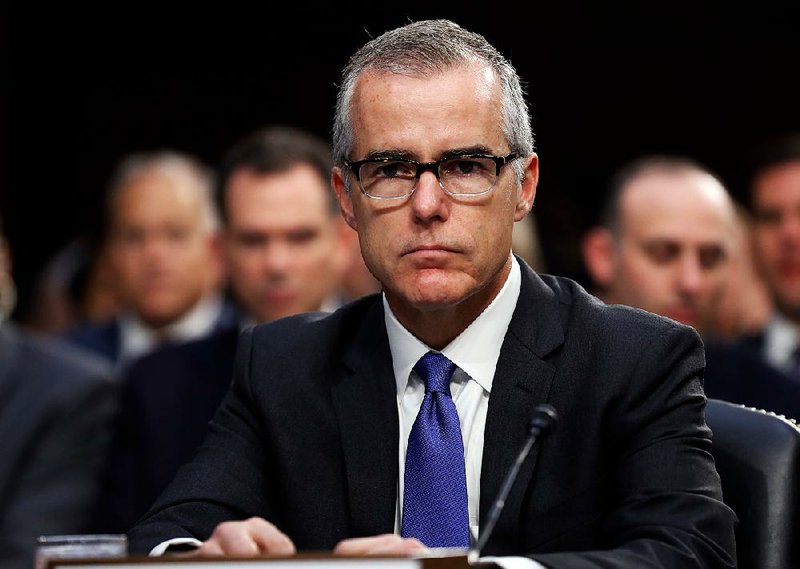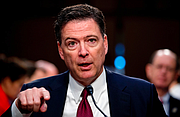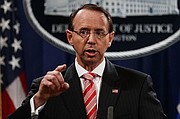Former acting FBI director Andrew McCabe said in an interview that aired Thursday that he authorized an investigation into President Donald Trump's ties to Russia a day after meeting with him in May 2017 out of fear that he could soon be fired.
"I was very concerned that I was able to put the Russia case on absolutely solid ground in an indelible fashion that were I removed quickly or reassigned or fired that the case could not be closed or vanish in the night without a trace," McCabe told CBS.
McCabe added: "I wanted to make sure that our case was on solid ground and if somebody came in behind me and closed it and tried to walk away from it, they would not be able to do that without creating a record of why they made that decision."
His comments marked the first time that McCabe has publicly addressed why he opened an investigation into Trump after the firing of FBI Director James Comey, whose post McCabe took over.
CBS broadcast a portion of an interview scheduled to air Sunday in full on 60 Minutes.
"I was speaking to the man who had just run for the presidency, and won the election for the presidency, and who might have done so with the aid of the government of Russia, our most formidable adversary on the world stage, and that was something that troubled me greatly," McCabe said, recalling his first meeting with Trump.
About two hours after the clip aired, Trump blasted McCabe on Twitter, calling him "a disgrace to the FBI and a disgrace to our Country."
"Disgraced FBI Acting Director Andrew McCabe pretends to be a 'poor little Angel' when in fact he was a big part of the Crooked Hillary Scandal & the Russia Hoax -- a puppet for Leakin' James Comey," the president wrote, referring to an FBI investigation into Democrat Hillary Clinton's use of a personal email server while secretary of state in addition to its investigation of possible coordination between the Trump campaign and Russia.
Trump said that McCabe "gave Hillary a pass." Senate Judiciary Chairman Lindsey Graham, R-S.C., issued a statement saying that the CBS interview made it "imperative" that McCabe appear before his committee to answer for "what appears to be, now more than ever, bias against President Trump."
In the clip that aired on CBS, McCabe did not address specific evidence that led him to believe Trump should be investigated personally.
It has been previously reported that the FBI began to explore at that point whether Trump was trying to obstruct justice, in part by firing Comey, and whether he personally was of concern from a counterintelligence perspective.
McCabe opened the case so quickly that some at the Justice Department were concerned that he might have acted too hastily because of Comey's removal, people familiar with the matter have said.
In a statement to CBS, White House press secretary Sarah Huckabee Sanders said that McCabe had "opened a completely baseless investigation into the president."
McCabe's interview comes ahead of the release next week of his memoir, The Threat: How the FBI Protects America in the Age of Terror and Trump.
25TH AMENDMENT
In the interview, McCabe also apparently addresses allegations he made in memos documenting discussions with Deputy Attorney General Rod Rosenstein.
It has been reported previously that McCabe alleged in the memos that Rosenstein suggested wearing a wire to surreptitiously record the president and that Cabinet members considered invoking the 25th Amendment to remove Trump from office.
During an appearance on CBS This Morning, Scott Pelley, the correspondent who interviewed McCabe, described the discussions of the 25th Amendment as "counting noses" -- or speculating on where various Cabinet members might stand on the question.
"There were meetings at the Justice Department in which it was discussed whether the vice president and a majority of the Cabinet could be brought together to remove the president of the United States under the 25th Amendment," Pelley said. "These were the eight days from Comey's firing to the point that Robert Mueller was appointed special counsel. And the highest levels of American law enforcement were trying to figure out what to do with the president."
Former law enforcement officials said the comments were made during a pair of meetings May 16, 2017. McCabe and his former colleagues kept contemporaneous memos on their interactions with Trump and Justice Department officials.
According to one of those memos written by McCabe, an excerpt from which was provided to The New York Times, the former FBI agent wrote that "we discussed the president's capacity and the possibility he could be removed from office under the 25th Amendment" and the deputy attorney general indicated he looked into the issue and determined he would need a "majority or eight of the 15 Cabinet officials." McCabe added that Rosenstein suggested that he might have supporters in the attorney general and the secretary of homeland security.
Pelley said McCabe disputes the assertion, advanced by defenders of Rosenstein, that the deputy attorney general was not serious about wearing a wire. Pelley said McCabe took the idea to FBI lawyers for a discussion afterward.
That, too, has been previously reported, though McCabe has never before publicly described his allegations.
In a statement, a Justice Department spokesman said McCabe's recitation of events -- at least according to a transcript reviewed by officials -- was "inaccurate and factually incorrect."
The spokesman repeated Rosenstein's imprecise disputes with McCabe's version of his comments on wearing a wire and invoking the 25th Amendment, saying: "The Deputy Attorney General never authorized any recording that Mr. McCabe references. As the Deputy Attorney General previously has stated, based on his personal dealings with the President, there is no basis to invoke the 25th Amendment, nor was the [Deputy Attorney General] in a position to consider invoking the 25th Amendment."
The spokesman also disputed that Rosenstein spoke with McCabe about appointing a special counsel and claimed, for the first time, that after Mueller was installed in the post, Rosenstein "directed that Mr. McCabe be removed from any participation in that investigation."
The meaning of that was not immediately clear. At a Senate Intelligence Committee hearing in June 2017, the month after Mueller was appointed, McCabe, appearing with Rosenstein, talked of the FBI's providing resources to the special counsel -- implying he was still involved at least in that respect.
"We have a robust relationship with the special counsel's office, and we are supporting them with personnel and resources in any way they request," he said.
At the same hearing, McCabe confirmed he was fully familiar with the scope of Mueller's investigation, though he noted that Mueller was still sorting out some details of it. And that same month, he signed a Foreign Intelligence Surveillance Act warrant that would allow the FBI to continue surreptitiously monitoring former Trump campaign adviser Carter Page, one of the early subjects of the Russia investigation.
As the interview clip aired, The Atlantic published an excerpt of McCabe's book, in which he describes his interactions with the president after Comey's firing.
In one encounter that he seems to view as particularly troubling, McCabe wrote that Trump pressed in an Oval Office meeting to visit the FBI, even though he had just fired its well-liked leader.
In McCabe's view, Trump was trying to enlist McCabe in a plan to send a sinister message to employees.
"In this moment, I felt the way I'd felt in 1998, in a case involving the Russian Mafia, when I sent a man I'll call Big Felix in to meet with a Mafia boss named Dimitri Gufield," McCabe wrote. "The same kind of thing was happening here, in the Oval Office. Dimitri had wanted Felix to endorse his protection scheme. This is a dangerous business, and it's a bad neighborhood, and you know, if you want, I can protect you from that. If you want my protection. I can protect you. Do you want my protection? The president and his men were trying to work me the way a criminal brigade would operate."
McCabe was fired from the bureau in March just 26 hours before he could retire, after the inspector general presented Justice Department leadership with allegations that McCabe had authorized a disclosure to the media and then lied repeatedly to investigators about it. The timing of the firing cost McCabe a significant portion of his retirement benefits.
In his tweet Thursday, Trump characterized the inspector general report as "devastating."
McCabe alleged his termination was politically motivated and meant to discredit the bureau and the ongoing Russia investigation.
Information for this article was contributed by Matt Zapotosky and John Wagner of The Washington Post; by Eric Tucker of The Associated Press; and by Adam Goldman and Matthew Haag of The New York Times.
A Section on 02/15/2019


